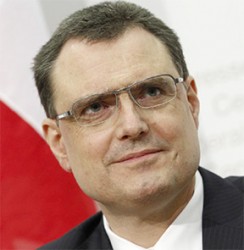ZURICH, (Reuters) – The Swiss National Bank shocked financial markets yesterday by scrapping a three-year-old cap on the franc, sending the currency soaring against the euro and stocks plunging on fears for the export-reliant Swiss economy.
Only days ago, SNB officials had described the 1.20 francs per euro cap, introduced in 2011 at the height of the euro zone crisis to fend off deflation and a recession, as a policy cornerstone.

The U-turn sent the franc nearly 30 percent higher against the euro in chaotic early trading. Coming a week before the European Central Bank is expected to unveil a bond-buying programme to counter deflationary pressures, it fed speculation that this quantitative easing (QE) scheme will be so big that the SNB would have struggled to defend the cap.
On social media, the move was dubbed “Fran-cogeddon”.
With more than 40 percent of Swiss exports going to the euro zone, firms across Switzerland warned of a plunge in profits, with the luxury and tourism industries most exposed.
“Today’s SNB action is a tsunami; for the export industry and for tourism, and finally for the entire country,” said Nick Hayek, chief executive of Swiss watch firm Swatch.
SNB Chairman Thomas Jordan denied at a news conference that the move amounted to a “panic reaction”, saying the cap had been scrapped because it was unsustainable.
“If you decide to exit such a policy, you have to take the markets by surprise,” Jordan said.
As it removed the upper limit on the currency, the SNB sought to discourage new flows into Swiss francs by pushing down its interest rate on some cash deposits held at the central bank by commercial banks and other financial institutions.
After taking the rate into negative territory last month for the first time since the 1970s, it cut another 0.5 percentage points yesterday to -0.75 percent.
“The values we currently see (on currency markets) point to a massive overvaluation of the franc,” Jordan said. “They should come back down to more sustainable levels. Markets tend to overreact when confronted with such a surprise.”
DAMAGING CONFIDENCE
Earlier this month, Jordan described the cap as “absolutely central”, while SNB vice-chairman Jean-Pierre Danthine said on Monday it would remain the cornerstone of SNB policy.
“This damages confidence in the Swiss National Bank that has always been saying it can keep up the minimum exchange rate,” said Alessandro Bee, economist at Swiss bank Sarasin. “I see big risks in this.”
In what now looks like a signal, Ernst Baltensperger, an influential academic and former SNB adviser who is close to Jordan, said last weekend the SNB should move away from the “temporary” cap.
Leading newspaper Neue Zuercher Zeitung described the move as “unavoidable”.
Swiss shares tumbled over 10 percent, putting them on track for their biggest one-day fall in at least 25 years and wiping about 100 billion Swiss francs off the main index.
Banks UBS and Credit Suisse were both down over 10 percent at 1315 GMT, while Richemont, which owns luxury watchmaker Cartier, and Swatch were the biggest losers, down roughly 15 percent.
Christian Levrat, president of the left-wing Social Democrat party, called the move “a serious threat for tens of thousands of Swiss jobs”.
It disrupted services for at least two major Swiss banks. PostFinance, one of Switzerland’s biggest banks for retail clients, temporarily stopped distributing euro bills.
Investors have been sweeping up the Swiss currency as the ECB considers QE and as Europe’s showdown with Russia over Ukraine adds to pressure on the euro.
In addition to lowering its sight deposit rate, the SNB said it would expand its three-month Libor target range to between -1.25 percent and -0.25 percent, from -0.75 percent to 0.25 percent previously.
NEW GAME PLAN?
Swissquote analysts Ipek Ozkardeskaya said recent heavy interventions to defend the cap may have forced the SNB’s hand.
“An accidental break of the floor would have been more serious for SNB credibility,” she said, adding the bank now needs a “new game plan” to steady the franc.
The franc broke past parity after the SNB’s announcement, hitting a high of 0.8500 francs per euro before trimming gains to trade at 1.0275 by 1900 GMT.
Fitch’s managing director of sovereign ratings, Ed Parker, said the move would not affect Switzerland’s top-grade credit rating.
“Clearly a change in monetary policy is an important event in terms of looking at what is going to happen to the Swiss economy but it is not a sovereign rating issue at the moment.”









